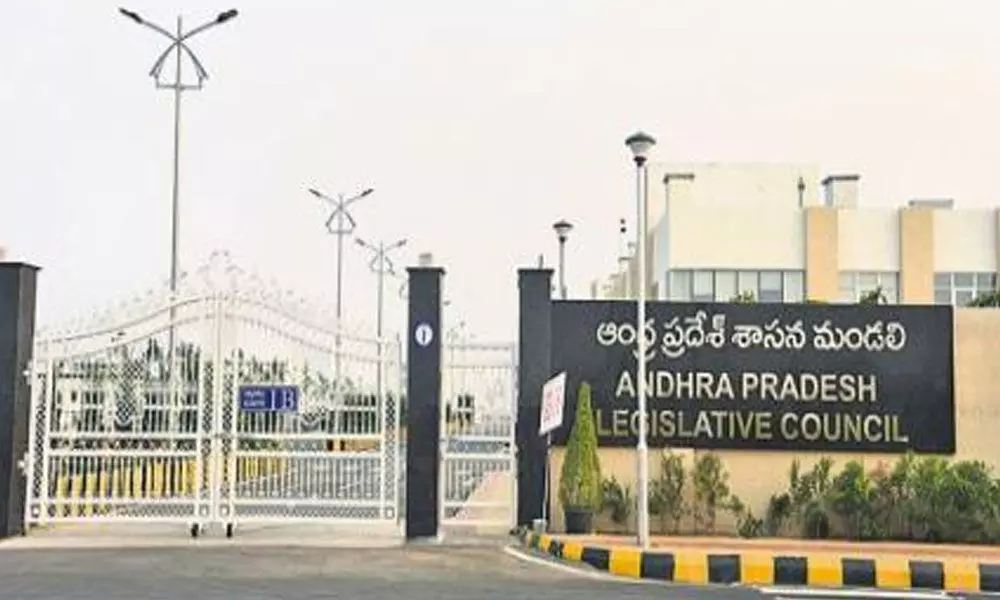Live
- The role of habit building in mental wellness
- Efforts to improve fishermen’s livelihood highlighted
- JNCASR team develops new tech for early, accurate detection of HIV
- Grand finale of Master Orator season-5 held
- Can digital chemistry turn into real love ?
- Almonds: A Key to Healthy Living
- Priyanka Chopra steals hubby Nick Jonas’ jacket
- Demolition of illegal buildings in Whitefield amid public scepticism
- TCS recruits 52 PB Siddhartha students
- Mcap plunges by Rs 2.19 L cr
Just In
Need for a national policy on legislative councils


The Andhra Pradesh Assembly has passed a resolution becoming the latest state to alter the status quo questioning the need for existence of an upper house which it considers an appendage and as a strain on the already troubled resources of the state, thereby wanting to completely do away with the legislative counci
The Andhra Pradesh Assembly has passed a resolution becoming the latest state to alter the status quo questioning the need for existence of an upper house which it considers an appendage and as a strain on the already troubled resources of the state, thereby wanting to completely do away with the legislative council.
The move has raised eyebrows particularly, as it comes after the council's opposition to the Andhra Pradesh Capital Region Development Authority(CRDA) Repeal Bill,2020 and the AP Decentralisation and Inclusive Development Of All Regions Bill, 2020, through which the government wants to facilitate the shifting of key capital functions from Amaravati to Vishakapatnam and Kurnool.
The ruling YSRCP has just 9 MLCs in the 58- strong upper house. The bills were passed in the Legislative Assembly but have been referred to the select committee in the upper house. While the quagmire of contradiction over the need and necessisity of an upper house has for long been there, the statement of the CM that the council is proving to be a stumbling block in getting its legislations passed is rather arbitrary and undemocratic because all that legislative council can do is only delay a money bill by 14 days, a non-money bill by 3 months or a money bill that is sent back to it by one month. What is unclear is whether, the abolition has been proposed because the council is doing its function of checks and balances or whether on the basis that the council has become redundant, superfluous and a lateral entry to the political unemployed.
A chequered history
The AP government had a legislative council since 1958, before it could be abolished by the then NTR government in 1985. Ironically, the council has risen from the ashes like phoenix after the former CM Late YS Rajashekar Reddy, the father of YS Jagan Mohan Reddy, has passed a resolution to that effect. The arguments presented then were:
a) That council ensures wider representation of the under-represented sections.
b) Council acts as a 'revising chamber'.
c) Council would ensure adequate scrutiny.
Even if the Council were to be abolished by the current dispensation, it is not too far away for it to be resurrected again, down the line. For instance, in Tamil Nadu, AIADMK supremo M.G. Ramachandran first abolished the council, which the DMK brought back for a brief instant, before it was abolished again by the late J. Jayalalithaa. This leads us to a fundamental question on as to:
a) Whether can the state keep playing fast and loose with legislative councils, abolishing and resurrecting it as per the whims and fancies of the ruling dispensation?
b) Can it be held hostage to vendetta politics?
c) And how does dissent and disagreement of the council make it a roadblock for the legislations, whilst the very role of a council is to put a check to the hasty rush of the ruling legislators to get bills passed, in the face of blatant populism.
Clarion call for a national policy
Constitution makers have seen the councils as necessary so as to ensure wider representation especially in larger states. But the pertinent question would be, did the councils ensure some positive impact on the quality of governance? Or have they functioned as a place to adorn the politically unemployed? Also, there is an argument that there is a huge wastage of tax payers money.
For instance, Rajasthan has stated that it would need 100 crore to establish the council. While the bills to re-establish councils in the state of Rajasthan, Assam, MP, Odisha are still pending in the Parliament, a Parliamentary Standing Committee on Law and Personnel in its report on the Rajasthan Legislative Council said that there is an urgent need to evolve a national policy on creation and abolition of councils so that the second chamber doesn't depend solely on the political considerations.
The council's election even today faces colonial hangover. It is incomprehensible as to why there is a separate need to have teachers and graduates included as separate electorates even today, with literacy rate of 75 per cent. We should do away with separate electorate for teachers and graduates.
Just as Rajya Sabha is supposed to be representative of the will of the states, the Legislative councils should represent the voices of the grass root governments - municipalities, district boards and panchayats. The local governments are not being sufficiently empowered by the parliament and state legislatures.
The council will be an ideal platform for local governments to exert the right kind of pressure in pushing for more funds, functions and functionaries.
(The authors are political entrepreneur, former Secretary of Hyderabad unit of Loksatta Party and a student respectively)

© 2024 Hyderabad Media House Limited/The Hans India. All rights reserved. Powered by hocalwire.com






